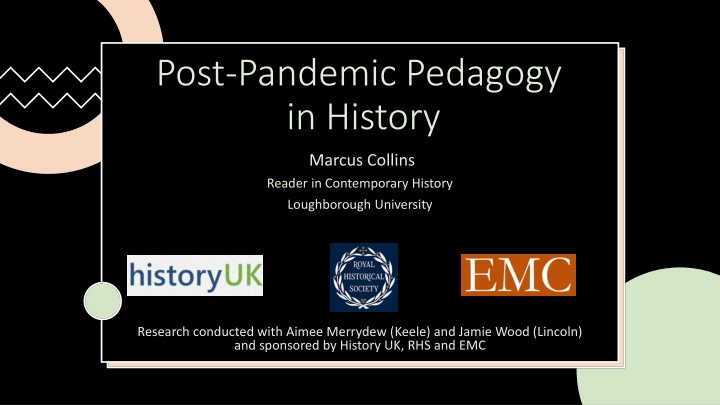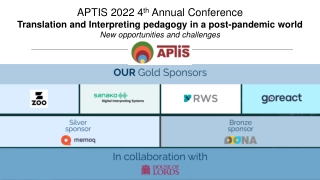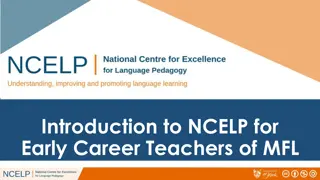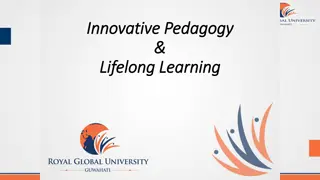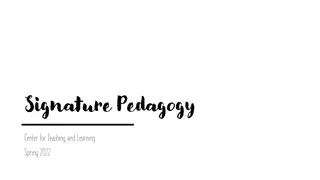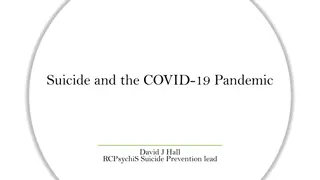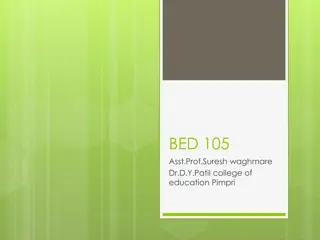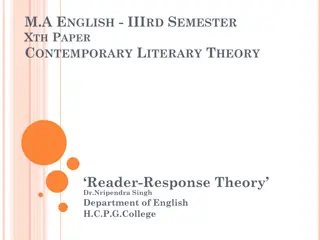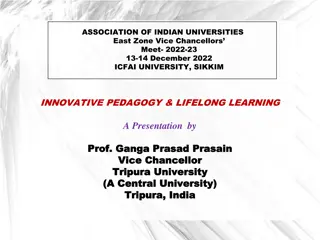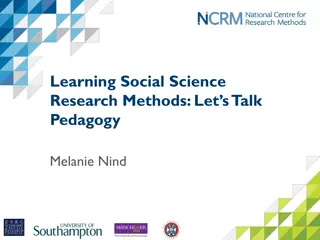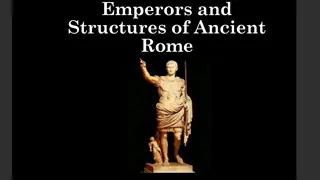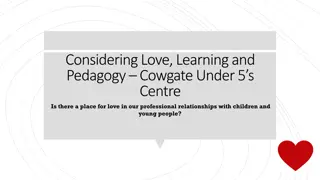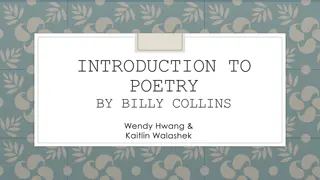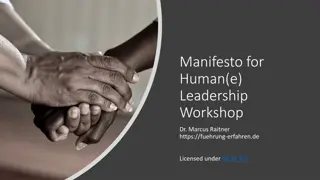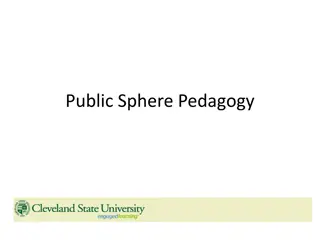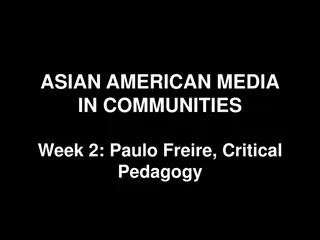"Post-Pandemic Pedagogy in History: Marcus Collins Reader in Contemporary History"
Research conducted by Loughborough University, Keele, and Lincoln explores post-pandemic pedagogy in history with Aimee Merrydew and Jamie Wood, sponsored by History UK, RHS, and EMC. The study delves into innovative teaching approaches shaped by the challenges of a global crisis, paving the way for a new era in history education.
Download Presentation

Please find below an Image/Link to download the presentation.
The content on the website is provided AS IS for your information and personal use only. It may not be sold, licensed, or shared on other websites without obtaining consent from the author.If you encounter any issues during the download, it is possible that the publisher has removed the file from their server.
You are allowed to download the files provided on this website for personal or commercial use, subject to the condition that they are used lawfully. All files are the property of their respective owners.
The content on the website is provided AS IS for your information and personal use only. It may not be sold, licensed, or shared on other websites without obtaining consent from the author.
E N D
Presentation Transcript
Post-Pandemic Pedagogy in History Marcus Collins Reader in Contemporary History Loughborough University Research conducted with Aimee Merrydew (Keele) and Jamie Wood (Lincoln) and sponsored by History UK, RHS and EMC
Survey conducted March to June 2021 565 respondents from 47 UK universities 36% from pre-92, 27% from post-92 and 35% from Russell Group universities 93% of respondents studying or teaching in England 58% female, 37% male, 2% non-binary 87% white, 3% Asian, 1% Black, 4% mixed ethnicity 20% full-time or part-time teaching staff 9% PGR or PGT 19% final-year UG 20% second-year UG 32% first-year UG
Identical questions asked to staff and students except in case of some questions for first-years, who could not compare their experience of higher education before Covid 100% of respondents answered closed multiple-choice questions 83% additionally answered open free-text questions, most of which asked them to explain their preferences for teaching and learning formats post- Covid
Student learning 100 90 80 70 60 50 40 30 20 10 0 Better Worse Staff Advanced students Comparisons of teaching and learning before and during Covid
Student learning Teaching methods 100 100 90 90 80 80 70 70 60 60 50 50 40 40 30 30 20 20 10 10 0 0 Better Worse Better Worse Staff Advanced students Staff Advanced students Comparisons of teaching and learning before and during Covid
Student learning Teaching methods 100 100 90 90 80 80 70 70 60 60 50 50 40 40 30 30 20 20 10 10 0 0 Better Worse Better Worse Staff Advanced students Staff Advanced students Teacher-student interaction 100 90 80 70 60 50 40 30 20 10 0 Better Worse Staff Advanced students Comparisons of teaching and learning before and during Covid
Student learning Teaching methods 100 100 90 90 80 80 70 70 60 60 50 50 40 40 30 30 20 20 10 10 0 0 Better Worse Better Worse Staff Advanced students Staff Advanced students Teacher-student interaction Assessment 100 40 90 35 80 30 70 25 60 50 20 40 15 30 10 20 5 10 0 0 Better Worse Better Worse Staff Advanced students Staff Advanced students Comparisons of teaching and learning before and during Covid
Feedback (staff) 100 90 80 70 60 50 40 30 20 10 0 Better Worse Feedback (advanced students) 100 90 80 70 60 50 40 30 20 10 0 Better Worse Comparisons of teaching and learning before and during Covid
Evaluations of teaching and learning before and during Covid by staff and advanced students (net %age better minus worse)
Evaluations of teaching and learning by staff and advanced students compared to ratings by first-year students
Online seminars, online libary that accessed any where and Blackboard sites can be Lectures, learning and wide range of resources made available online independent Pre-recorded lectures, assessments, secondary reading and Online live seminars, essay- based assessments, understanding from teaching staff Online seminars, access to sources and books online, fast communication between lecturers Online recorded lectures and constructive help from tutors when emailed Answers by first-years to question In your experience, what are the three aspects of teaching and learning that have been most effective during the pandemic?
Staff 100 90 80 70 60 50 40 30 20 10 0 In-person only Remote only Mix Before During After Advanced students 100 90 80 70 60 50 40 30 20 10 0 Remote only In-person only Mix Before During After Seminars: Experiences before and during the pandemic and preferences afterwards Frederick Jackson Turner (R) leads seminar at Wisconsin State Historical Library, c. 1893
100 100 90 90 80 80 70 70 60 60 50 50 40 40 30 30 20 20 10 10 0 0 In-person only Remote only Mix In-person only Remote only Mix Before After Before After Staff Staff 100 100 90 90 80 80 70 70 60 60 50 50 Staff 40 40 100 30 30 20 50 20 10 0 10 Seminars: Experiences before and preferences after the pandemic 0 0 In-person only Remote only Mix In-person only Remote only Mix Before After Before After Before After
Staff 100 90 80 70 60 50 40 30 20 10 0 In-person only Remote only Mix Before During After Advanced students 100 90 80 70 60 50 40 30 20 10 0 Remote only In-person only Mix Before During After Lectures: Experiences before and during the pandemic and preferences afterwards Frederick Jackson Turner (R) leads seminar at Wisconsin State Historical Library, c. 1893 A lecture at University of Bologna in the late fourteenth century
Staff 100 90 80 70 60 50 40 30 20 10 0 None - CW Closed book Open book Before During After Advanced students 100 90 80 70 60 50 40 30 20 10 0 None - CW Closed book Open book Before During After Exams: Experiences before and during the pandemic and preferences afterwards Frederick Jackson Turner (R) leads seminar at Wisconsin State Historical Library, c. 1893 A lecture at University of Bologna in the late fourteenth century Examination hall at University of Cape Town, 2015
Lectures Seminars 100 100 90 90 80 80 70 70 60 60 50 50 40 40 30 30 20 20 10 10 0 0 In-person only Remote only Mix In-person only Remote only Mix Staff Adv. stdnt 1st years Staff Adv. stdnt 1st years Supervisions 100 90 80 70 60 50 40 30 20 10 0 In-person only Remote only Mix Staff Adv. stdnt 1st years Comparison of preferences after the pandemic by E. Mids staff, advanced students and first years
Feedback Exams 100 100 90 90 80 80 70 70 60 60 50 50 40 40 30 30 20 20 10 10 0 0 Written/recorded Face-to-face Mix None - CW Closed book Open book Staff Adv. stdnt 1st years Staff Adv. stdnt 1st years Out-of-class group work Independent study 100 100 90 90 80 80 70 70 60 60 50 50 40 40 30 30 20 20 10 10 0 0 Working environment Home environment In-person only Remote only Mix Staff Adv. stdnt 1st years Staff Adv. stdnt 1st years Comparison of preferences after the pandemic by E. Mids staff, advanced students and first years
Provisional conclusions Negative Transformative Divisive
Divisive? - Staff, advanced students and first-years - Men and women - Older and younger staff - Russell Group and post-92s - Teachers and managers - Teaching philosophies Questions or comments? E-mail marcus.collins@lboro.ac.uk
